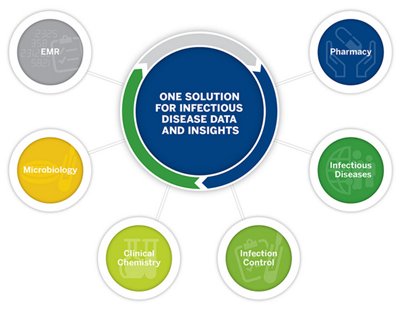
Viewpoints Series: How Advanced Analytics and Data Sharing Help Strengthen Chile’s Response to Antimicrobial Resistance
SUMMARY
Collecting and analyzing local antimicrobial resistance (AMR) data is a key part of any holistic antimicrobial stewardship (AMS) strategy. In Chile, more than 40 hospitals are utilizing a cloud-based advanced analytics solution to combine their AMR data and generate powerful insights to promote AMS at both a patient and population level. This innovative solution helps reduce the burden of reporting while providing accessible data and automated analysis across a diverse, country-wide network of hospitals that make up the Collaborative Group for Antimicrobial Resistance in Chile.
Viewpoints Series Featured Expert:
Patricia Gonzalez, MD, Medical Advisor at bioMérieux in Chile
Patricia Gonzalez, MD, is a medical advisor at bioMérieux and is experienced in infection control and clinical microbiology leadership. In 2021, a case study was published about her collaborative work to bring awareness and visibility for bioMérieux’s software-as-a-service (SaaS) advanced analytics solution, CLARION™, to the hospital network in Chile to support AMS across the country. Now, Dr. Gonzalez shares her perspective on how this partnership has made a difference in the fight against AMR.
_____________________________________________________________
bioMérieux: What was your role in this partnership between bioMérieux and the Collaborative Group for Antimicrobial Resistance in Chile?
Dr. Gonzalez: My main role in this project was to increase the visibility of the tool in order to expand the number of institutions participating in the project. To support this objective, I helped harmonize the data collected throughout the year and worked with an internal programmer to create a data visualization to represent each center using the information. At a high level, I promoted the analysis and diffusion of the data to the scientific community.
bioMérieux: What challenges do healthcare providers face when diagnosing and treating bacterial infections that are specific to this region? What pathogens are of special concern for Chile?
Dr. Gonzalez: One of our main challenges is to ensure correct antimicrobial susceptibility testing (AST) interpretation at both the laboratory and clinical levels, which requires continuous medical education. Regional pathogens of concern due to drug resistance in Chile include Pseudomonas aeruginosa, Carbapenem-resistant Enterobacterales (CRE) and Vancomycin-resistant Enterococci (VRE).
bioMérieux: What was the implementation process like to connect various AMR surveillance networks and set up a software solution like this across multiple hospitals?
Dr. Gonzalez: The CLARION project was initiated to support the national surveillance network by maximizing the use of existing data collected from molecular diagnostic tools. This tool automatically extracts AST data on an annual basis from each site and anonymizes it, following the deduplication rules recommended by the Clinical and Laboratory Standards Institute (CLSI) to create an accurate, cumulative antimicrobial report. This process integrates comparable data into the surveillance network with little to no extra work for each institutional site.
bioMérieux: Why is it important to be able to distinguish if a multi-drug resistant organism (MDRO) was detected in a hospital or in an outpatient setting?
Dr. Gonzalez: It’s very important to collect AST data from different sources and clinical settings since it forms the basis for empiric treatments. Our work showed that the CLARION software was able to greatly reduce the time it took various hospitals within the Collaborative Group for Antimicrobial Resistance in Chile to report and share data.
bioMérieux: What impact does the availability of data like this have on the patient treatment level? On a population-wide level, what impact can the data have in informing public health efforts?
Dr. Gonzalez: At a patient level, this information guides empiric treatment for patient care based on each institution’s epidemiologic data until lab results can inform targeted antibiotic use. On a national level, trend data is crucial to measure AMS efforts against standard procedures and guidelines. In 2020, Chile enacted mandatory AMS at hospitals as an accreditation requirement. Antibiogram data and other cumulative data about resistance trends must be shared in order to detect changes in local patterns, the emergence and spread of unusual phenotypes, and to implement intervention strategies.
_____________________________________________________________
References
To read the original case study about CLARION in Chile, access the PDF on our Learning Lounge at https://lounge.biomerieuxconnection.com/clarion-case-study-chile.html (PRN 059854-Rev01.A)
GET STARTED
Access Dr. Rawson's supplementary slides.
Download
- Filename
- LL-Viewpoints-Series_Advanced-Analytics--amp--Data-for-AMR-in-Chile---Patricia-Gonzalez_February2023.pdf
- Size
- 417 KB
- Format
- application/pdf
Read Time: 3 minutes
Download a PDF of the Original Case Study in Chile
Download
- Filename
- 21-CLARION-Chile_Case-Study_V3c-RACM-PRN-059854-Rev-01_A_Final-Art-27Sept.pdf
- Size
- 9 MB
- Format
- application/pdf
Read Time: 4 minutes
PUBLISHED BY
Learning Lounge Exclusive
February 1, 2023


